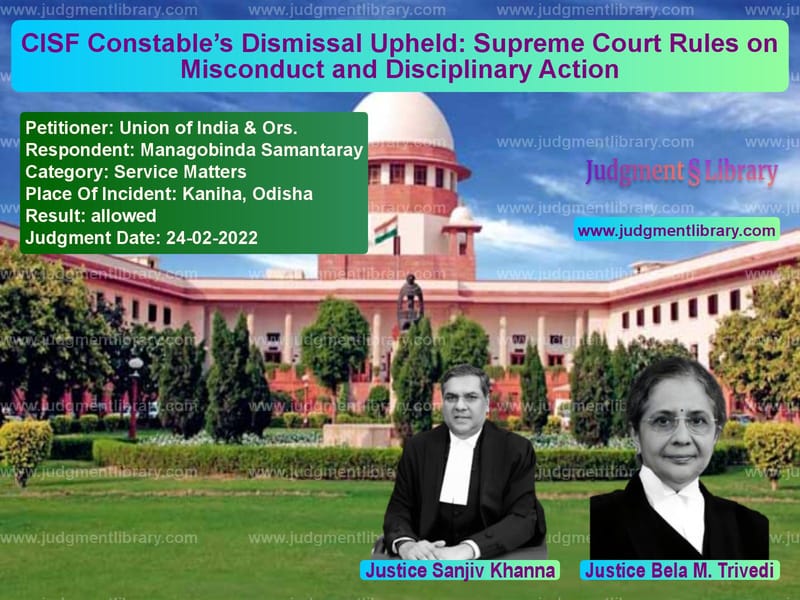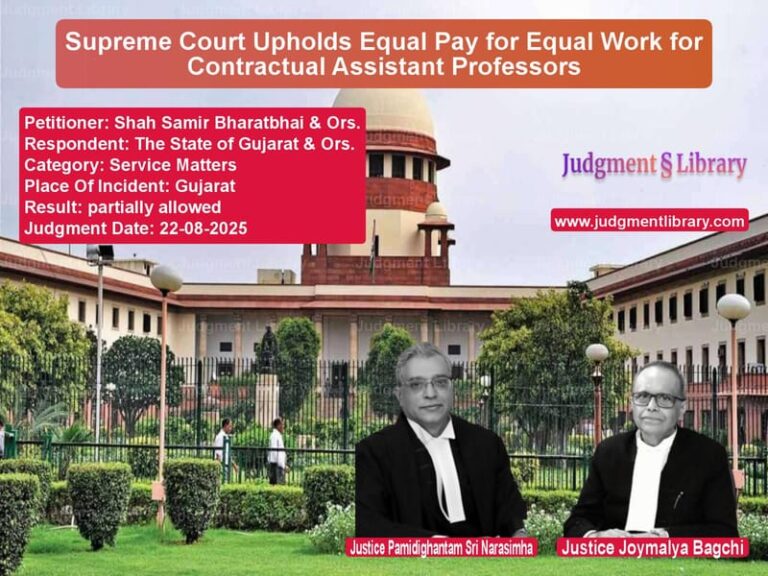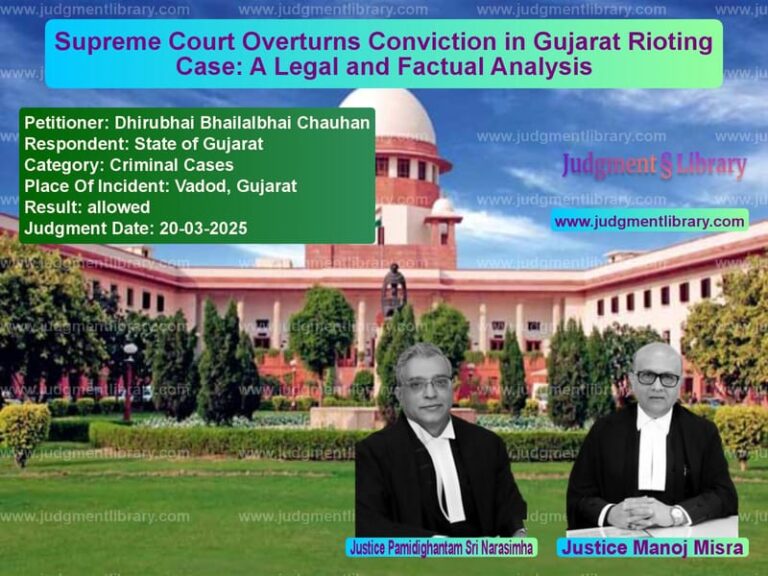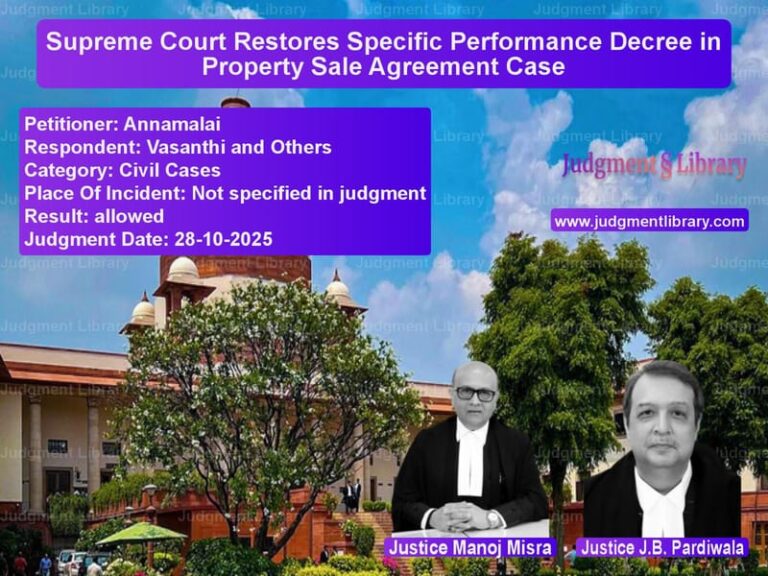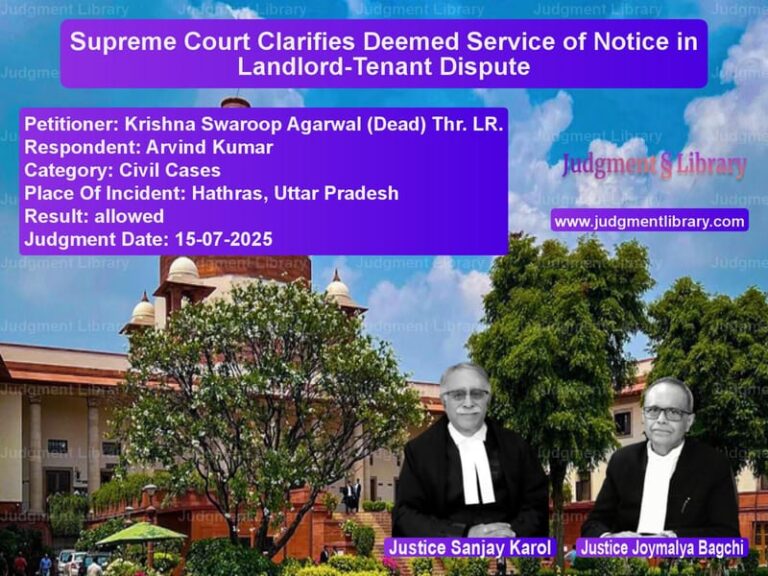CISF Constable’s Dismissal Upheld: Supreme Court Rules on Misconduct and Disciplinary Action
The Supreme Court of India recently delivered a significant ruling in the case of Union of India & Ors. vs. Managobinda Samantaray, dealing with the dismissal of a Central Industrial Security Force (CISF) constable on charges of misconduct. The judgment clarifies the principles governing disciplinary proceedings, procedural fairness, and the quantum of punishment in cases involving security personnel.
Background of the Case
The respondent, Managobinda Samantaray, was a constable in the CISF assigned to patrolling duty at the National Thermal Power Corporation (NTPC) Plant, Kaniha. On the night of 3rd and 4th January 2000, while on patrol between Watch Tower No. 5 and Watch Tower No. 6, he was found sleeping by his superior, ASI/Exe. B. Panda.
Key developments:
- When confronted by ASI B. Panda, the respondent allegedly misbehaved, abused, and assaulted his superior on the right shoulder with a short lathi.
- The officer was taken to the hospital for treatment.
- The respondent was placed under suspension on 4th January 2000 and was served with a charge sheet.
- The disciplinary inquiry found the charges proved, and on 15th July 2000, the Disciplinary Authority imposed a penalty of a reduction in pay by two stages for three years, with postponement of future increments.
- The respondent appealed against the penalty, but instead of relief, he was issued a Show Cause Notice for enhancement of the penalty to dismissal from service.
- On 23rd January 2001, the Appellate Authority dismissed the respondent from service.
- The respondent challenged his dismissal before the Orissa High Court, which ruled in his favor on procedural grounds and remanded the matter to the Appellate Authority for fresh consideration.
- Upon reconsideration, the Appellate Authority reaffirmed the dismissal on 18th February 2012.
- The respondent again challenged the order, and the High Court set aside the dismissal, ordering reinstatement with 50% back wages.
- The Union of India challenged the High Court’s decision before the Supreme Court.
Petitioner’s Arguments (Union of India)
- The Union of India contended that the respondent was guilty of serious misconduct, including assaulting a superior officer, which warranted dismissal.
- It argued that the High Court erred in interfering with the disciplinary authority’s decision, as judicial review in disciplinary matters is limited.
- The government cited previous judgments affirming that security personnel must adhere to strict discipline and that leniency would undermine the organization’s integrity.
- They emphasized that the respondent had been given due process, including a Show Cause Notice before the penalty was enhanced to dismissal.
Respondent’s Arguments (Managobinda Samantaray)
- The respondent argued that the punishment was excessive and disproportionate to the alleged misconduct.
- He contended that the inquiry suffered from procedural lapses and that he was denied an opportunity to properly defend himself.
- The High Court had rightly found that the dismissal was harsh and warranted modification.
- He further argued that he had already served a long period without employment and sought reinstatement with full back wages.
Supreme Court’s Judgment
The Supreme Court set aside the High Court’s order and upheld the dismissal of the respondent from service.
Key Observations:
- The Court emphasized that discipline is paramount in the security forces and that any act of indiscipline, especially an assault on a superior officer, must be dealt with strictly.
- It held that the High Court had exceeded its jurisdiction by interfering in the quantum of punishment, which is within the domain of the disciplinary authority.
- The Court found that the Appellate Authority had given the respondent sufficient opportunity to respond to the enhanced penalty.
- It also ruled that while judicial review can examine procedural fairness, it cannot substitute its own views on punishment unless the penalty is grossly disproportionate.
Key Excerpts from the Supreme Court Judgment
On the importance of discipline in security forces, the Court observed:
“Discipline is the essence of the organization and structure of the police force. No indulgence or latitude can be granted when the case is of violence and assault on the officer who had checked and reprimanded the respondent. To condone the misconduct will have ramifications.”
On the limited scope of judicial review in disciplinary matters, the Court stated:
“Writ jurisdiction is circumscribed by limits of correcting errors of law, procedural error leading to manifest injustice, or violation of principles of natural justice. The decision is also disturbed when it is found to be ailing with perversity.”
On the proportionality of punishment, the Court ruled:
“Given the nature of the appellant’s force, a sense of integrity, commitment, discipline, and camaraderie is paramount. The respondent had not even expressed any remorse or pleaded a good ground for having acted in the manner he did. We do not accept that the punishment of dismissal imposed by the Appellate Authority was grossly disproportionate to the quantum of the offence.”
Final Verdict
The Supreme Court issued the following directions:
- The dismissal of Managobinda Samantaray was upheld.
- The Union of India was directed to pay subsistence allowance for the period of suspension from 4th January 2000 to 15th July 2000.
- The respondent was entitled to his salary for the period between 16th July 2000 and 23rd January 2001, when the first dismissal order was passed.
- For the period between 24th January 2001 and 18th February 2012, the respondent was entitled to subsistence allowance at 50% of his salary.
- All outstanding dues were to be paid within six weeks, with an interest of 7% per annum.
Conclusion: Implications of the Judgment
This ruling reinforces strict discipline in security forces and the limited scope of judicial review in disciplinary matters:
- It affirms that security personnel are held to higher standards of discipline and integrity.
- Judicial review in disciplinary matters is limited to ensuring procedural fairness but cannot interfere with punishment unless it is shockingly disproportionate.
- The judgment sets a precedent for handling cases of misconduct in uniformed services, ensuring that acts of violence against superiors are dealt with firmly.
- It underscores the importance of following due process in disciplinary actions, including providing adequate opportunities to respond to enhanced penalties.
By upholding the dismissal of the CISF constable, the Supreme Court has reinforced the principle that disciplinary authorities must have the discretion to impose penalties necessary to maintain institutional integrity.
Petitioner Name: Union of India & Ors..Respondent Name: Managobinda Samantaray.Judgment By: Justice Sanjiv Khanna, Justice Bela M. Trivedi.Place Of Incident: Kaniha, Odisha.Judgment Date: 24-02-2022.
Don’t miss out on the full details! Download the complete judgment in PDF format below and gain valuable insights instantly!
Download Judgment: union-of-india-&-ors-vs-managobinda-samantar-supreme-court-of-india-judgment-dated-24-02-2022.pdf
Directly Download Judgment: Directly download this Judgment
See all petitions in Disciplinary Proceedings
See all petitions in Public Sector Employees
See all petitions in Termination Cases
See all petitions in Employment Disputes
See all petitions in Pension and Gratuity
See all petitions in Judgment by Sanjiv Khanna
See all petitions in Judgment by Bela M. Trivedi
See all petitions in allowed
See all petitions in supreme court of India judgments February 2022
See all petitions in 2022 judgments
See all posts in Service Matters Category
See all allowed petitions in Service Matters Category
See all Dismissed petitions in Service Matters Category
See all partially allowed petitions in Service Matters Category

